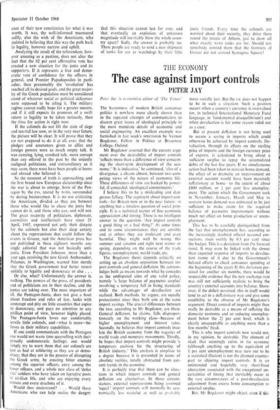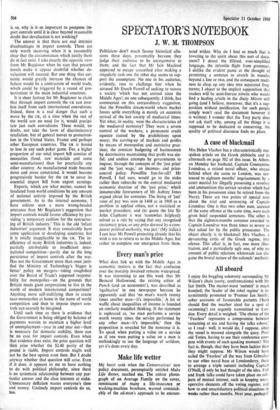The case against import controls
THE ECONOMY PETER JAY
Peter Jay is economics editor of The Times.'
The barrenness of modern British consensus politics is nowhere more clearly shown than in the repeated attempts of commentators to
discern great issues of ideological principle in the most mundane details of economic and social engineering. An excellent example was furnished in last week's SPECTATOR by Vernon Bogdanor, Fellow in Politics at Brasenose College, Oxford.
Mr Bogdanor asserted that the current argu- ment over the desirability of import controls
'reflects more than a difference of view concern- ing the short-term development of the eco- nomy.' It is indicative,' he continued, 'also of a divergence, a chasm almost, between two com- peting views of the nature of economic life. These differences of view are backed by power- ful, if concealed, ideological commitments.'
I believe this to be a misleading and dan- gerous fallacy. The argument about import con- trols—for Britain now or in the near future—is anything but a timeless question of social prin- ciple. It is a technical matter of fine economic appreciation and timing. There is no intelligent answer to the question, 'Are import controls a good thing or a bad thing?' At some times and in some circumstances they are sensible and at others they are irrelevant and even harmful. They might well be wrong this summer and autumn and right next winter or spring, depending on the course of the trade figures, unemployment, world trade, etc.
The Bogdanor thesis depends critically on setting up an absolute opposition between im- port controls and general deflation. He acknow- ledges both as means towards what he concedes as the undisputed aims of any valid policy, namely 'a large balance of payments surplus' involving a temporary fall in living standards while the advantages of devaluation are realised. Both methods, he argues, are equally protectionist since they both aim at the same import savings. The crucial differences between the two, according to Mr Bogdanor, are these. General deflation, he claims, falls dispropor- tionately on the working class—because of higher unemployment and interest rates. Secondly, he believes that import controls insu- late the British economy from the- vagaries of world trade and monetary movements. Thirdly, he hopes that import controls might provide 'a temporary cushion for the structuring of British industry.' This analysis is simplisie to a degree because it is presented in terms of absolute verities, totally abstracted from cur- rent trends in the economy.
It is perfectly true that there can be situa- tions in which import controls and general deflation are alternatives. In those circum- stances, external repercussions being assumed `equal,' import controls will normally be eco- nomically less wasteful as well as probably more socially just. But the Lac does not happen to be in such a situation. Such a position
occurs when a country's currency is overvalued (or, in technical International Monetary Fund language, in 'fundamental disequilibrium') and when devaluation is for some reason ruled out as a cure.
But at present deflation is not being used to secure a saving in imports which could otherwise be achieved by import controls. De- valuation, through its effects on the sterling price of imports and the foreign currency price of exports, is calculated to bring about a sufficient surplus to repay the accumulated debts of the last five years. If no simultaneous action had been taken to restrain home demand, the effect of so dramatic an improvement .on external account would have been massively reflationary at home—to the extent of about £800 million, or per cent less unemploy- ment. The action which the Government took in November, January, March and May to restrain home demand was estimated to be just sufficient to make room for the required balance of payments improvement without, much net effect on home production or unem- ployment.
This has to be carefully distinguished from the fact that unemployment has, according to the increasingly doubted official seasonal cor- rections, risen swiftly by 0.3 per cent since the budget. This is a deviation from the forecast trend. It may even be linked with the slower than expected response of imports to devalua- tion (some of it due to the Government's belated efforts to check consumer spending at the beginning of the year). If this deviation per- sisted for another six months, there would be respectable evidence that the new exchange rate was still not sufficiently realistic to bring the country's external accounts into balance. More- over, if the deficit persisted, this in itself would 'tend to act in a deflationary way and give some credibility to the obverse of Mr Bogdanor's argument. Direct control of imports might then really be desirable as a means of reflating the domestic economy and so reducing unemploy- ment below the 24- per cent level, which is clearly unacceptable as anything more than a few months' freak.
This is why import controls now would not, in my opinion, be desirable. The element of slack that seemingly exists in tile economy (although anything up to the equivalent of
per cent unemployment may turn out to be a statistical illusion) is not the planned counter- part to abjuring import controls. It is an unintended and hopefully, very short-lived aberration associated with the exceptional un- certainties of timing that inevitably occur in the rare circumstances of a post-devaluation adjustment from excess home consumption to external surplus.
But, Mr Bogdanor might object, even if this is so, why is it so important to postpone im- port controls until it is clear beyond reasonable doubt that devaluation is not working?
The answer is that there are real intrinsic disadvantages in import controls. These are only worth incurring when it is reasonably clear that the circumstances which justify them do in fact exist. I take exactly the opposite view from Mr Bogdanor when he says that present trends make it appear doubtful whether de- valuation will succeed. But one thing that cer- tainly would greatly increase the chances of failure would be a contraction of world trade, which could be triggered by a round of pro- tectionism in the main industrial countries.
It is sheer fantasy for Mr Bogdanor to claim that through import controls the UK can insu- late itself from such international convulsions.
Indeed, there is a real danger that such a move by the ux, at a time when the rest of the world saw no need for it, would precipi- tate just such convulsions. These would, no doubt,. not take the form of discriminatory retaliation, but of general moves to protection- Lim in the United States, France and perhaps other European countries. The UK is bound to lose in any such poker game. For, a higher proportion of our total import bill consists of necessities (food, raw' materials and some semi-manufactures) than for practically any Other country. As manufactured trade became more and more constricted, it would become progressively harder for the Inc to cover its essential import bill from export earnings. Exports, which are what matter, cannot be insulated from world conditions by any amount of national activity imposed by the British government. As to the internal economy, I have seldom seen a more wrong-headed utterance than Mr Bogdanor's suggestion that import controls would favour efficiency by pro- viding `a temporary cushion for the restructur- ing of British industry.' This is the old 'infant industries' argument. It may conceivably have some application to developing countries; but it is totally inapplicable to the UK. The in- efficiency of many British industries is, indeed, partially attributable to insufficient inter- national competition—partly due to the long Persistence of import controls after the war. Has not the Government more than once justi- fied the Ministry of Technology's 'bigger is better' policy 'on mergers—riding roughshod over the Board of Trade's supposed responsi- bility for monopolies—on the grounds that Britain needs giant corporations to live in the world of modern international competition?
Anything more self-stultifying than to create near-monopolies at home in the name of world competition and then to impose import con- trols can scarcely be imagined.
Until such time as there is evidence that the Government is being obliged by balance of payments worries to maintain a higher level of unemployment—year in and year out—than is necessary for domestic stability, there can be no case for import controls. Even when that evidence does exist, the prior question will then arise whether the $2.40 parity of the pound is viable. Import controls might well not be the best option even then. But I doubt anyway whether that question will arise. Even if it does, it appears to me to have nothing to do with political philosophy, since there is no systematic relationship between any par- ticular answer and the class interests at stake. Unnecessary deflation wastes everyone's time and money. Untimely import controls do so, too.







































 Previous page
Previous page